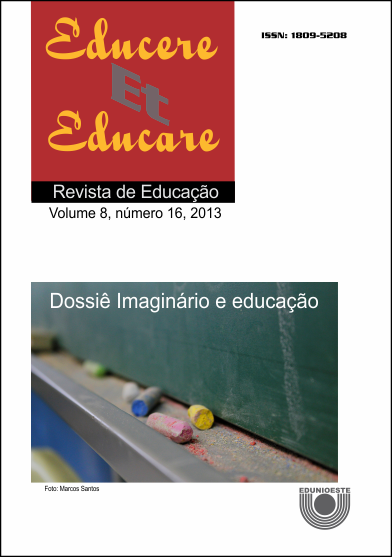Mythologies in Educational Imaginary
DOI:
https://doi.org/10.17648/educare.v8i16.9128Keywords:
Imaginário, Educação, Mitologia, Pigmalião, TeseuAbstract
The worldview of modernity and the paradigm of rationality are in an advanced state of disintegration. The school, created to undertake the project of modernity is being challenged on their goal of forming rational beings enabled the field of technology and success in the working world, however incapable of dreaming.This article aims to highlight the importance of imaginary to understand the ideal human development from the myths of Pygmalion and Theseus. The educational ideas are steeped in symbols and myths that are underlying the rational construction of pedagogical discourse. We need to understand the strength of the educational imaginary constitution of our teaching.Downloads
Published
05-12-2013
How to Cite
SCHROEDER - UNIVERSIDADE ESTADUAL DO OESTE DO PARANÁ, T. M.; RECHIA - UNIVERSIDADE TUIUTI DO PARANÁ, T. Mythologies in Educational Imaginary. Educere et Educare, [S. l.], v. 8, n. 16, p. 383–392, 2013. DOI: 10.17648/educare.v8i16.9128. Disponível em: https://e-revista.unioeste.br/index.php/educereeteducare/article/view/9128. Acesso em: 6 dec. 2025.
Issue
Section
Núcleo Temático: Imaginário e Educação
License
Aviso de Direito Autoral Creative Commons
Política para Periódicos de Acesso Livre
Autores que publicam nesta revista concordam com os seguintes termos:
1. Autores mantém os direitos autorais e concedem à revista o direito de primeira publicação, com o trabalho simultaneamente licenciado sob a Licença Creative Commons Attribution que permite o compartilhamento do trabalho com reconhecimento da autoria e publicação inicial nesta revista.2. Autores têm autorização para assumir contratos adicionais separadamente, para distribuição não-exclusiva da versão do trabalho publicada nesta revista (ex.: publicar em repositório institucional ou como capítulo de livro), com reconhecimento de autoria e publicação inicial nesta revista.
3. Autores têm permissão e são estimulados a publicar e distribuir seu trabalho online (ex.: em repositórios institucionais ou na sua página pessoal) a qualquer ponto antes ou durante o processo editorial, já que isso pode gerar alterações produtivas, bem como aumentar o impacto e a citação do trabalho publicado (Veja O Efeito do Acesso Livre).
Licença Creative Commons
Esta obra está licenciada com uma Licença Creative Commons Atribuição-NãoComercial-CompartilhaIgual 4.0 Internacional, o que permite compartilhar, copiar, distribuir, exibir, reproduzir, a totalidade ou partes desde que não tenha objetivo comercial e sejam citados os autores e a fonte.


